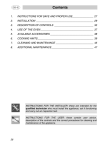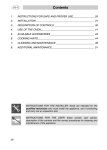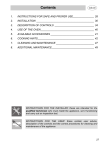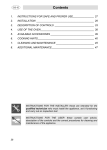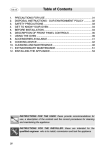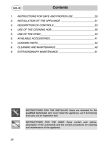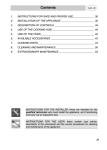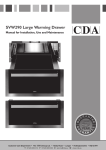Download Smeg SI850P5 FORNI INCASSO FORNO ARROTONDATO SERIE 800, ELETTRICO , PANNA, 60 CM. CLASSE ENERGETIC
Transcript
Contents 1. INSTRUCTIONS FOR SAFE AND PROPER USE_______________ 29 2. INSTALLATION _________________________________________ 31 3. DESCRIPTION OF CONTROLS ____________________________ 35 4. USE OF THE OVEN ______________________________________ 41 5. AVAILABLE ACCESSORIES _______________________________ 42 6. COOKING HINTS ________________________________________ 43 7. CLEANING AND MAINTENANCE ___________________________ 49 8. ADDITIONAL MAINTENANCE ______________________________ 51 INSTRUCTIONS FOR THE INSTALLER: these are intended for the qualified technician who must install the appliance, set it functioning and carry out an inspection test. INSTRUCTIONS FOR THE USER: these contain user advice, description of the controls and the correct procedures for cleaning and maintenance of the appliance. 28 Introduction 1. INSTRUCTIONS FOR SAFE AND PROPER USE THIS MANUAL IS AN INTEGRAL PART OF THE APPLIANCE AND THEREFORE MUST BE KEPT IN ITS ENTIRETY AND IN AN ACCESSIBLE PLACE FOR THE WHOLE WORKING LIFE OF THE OVEN. WE ADVISE CAREFUL READING OF THIS MANUAL AND ALL THE INSTRUCTIONS THEREIN BEFORE USING THE OVEN. INSTALLATION MUST BE CARRIED OUT BY QUALIFIED PERSONNEL IN ACCORDANCE WITH THE REGULATIONS IN FORCE. THIS APPLIANCE IS INTENDED FOR DOMESTIC USES AND CONFORMS TO CURRENT REGULATIONS IN FORCE. THE APPLIANCE HAS BEEN BUILT TO CARRY OUT THE FOLLOWING FUNCTIONS: COOKING AND HEATING-UP OF FOOD. ALL OTHER USES ARE CONSIDERED IMPROPER. THE MANUFACTURER DECLINES ALL RESPONSIBILITY FOR IMPROPER USE. DO NOT LEAVE THE PACKING IN THE HOME ENVIRONMENT. SEPARATE THE VARIOUS WASTE MATERIALS AND TAKE THEM TO THE NEAREST SPECIAL GARBAGE COLLECTION CENTRE. IT IS OBLIGATORY FOR THE ELECTRICAL SYSTEM TO BE EARTHED ACCORDING TO THE METHODS REQUIRED BY SAFETY RULES. WHEN LINKING UP TO MAINS BY PLUG AND SOCKET, MAKE SURE THAT BOTH ARE COMPATIBLE AND CONNECT BY MEANS OF A POWER CABLE COMPLYING WITH APPLICABLE REGULATIONS. THE SOCKET MUST BE ACCESSIBLE AFTER THE APPLIANCE HAS BEEN BUILT IN. NEVER UNPLUG BY PULLING ON THE CABLE. DO NOT OBSTRUCT VENTILATION OUTLETS AND HEAT DISPERSAL SLITS. IMMEDIATELY AFTER INSTALLATION CARRY OUT A BRIEF INSPECTION TEST OF THE OVEN, FOLLOWING THE INSTRUCTIONS BELOW. SHOULD THE APPLIANCE NOT FUNCTION, DISCONNECT IT FROM THE SUPPLY AND CALL THE NEAREST TECHNICAL ASSISTANCE CENTRE. NEVER ATTEMPT TO REPAIR THE APPLIANCE. ALWAYS CHECK THAT THE CONTROL KNOBS ARE IN THE “ZERO” (OFF) POSITION WHEN YOU FINISH USING THE OVEN. 29 Introduction NEVER PUT INFLAMMABLE OBJECTS IN THE OVEN: THEY COULD BE ACCIDENTALLY CATCH LIGHT AND CAUSE FIRES. DURING USE THE APPLIANCE BECOMES VERY HOT. TAKE CARE NOT TO TOUCH THE HEATING ELEMENTS INSIDE THE OVEN. THE I.D. PLATE WITH TECHNICAL DATA, REGISTRATION NUMBER AND BRAND NAME IS POSITIONED VISIBLY ON THE OVEN DOOR FRAME. THE PLATE MUST NOT BE REMOVED. THE OVEN IS DESIGNED FOR USE BY ADULTS. DO NOT ALLOW CHILDREN TO GO NEAR OR PLAY WITH IT. THIS APPLIANCE IS MARKED ACCORDING TO THE EUROPEAN DIRECTIVE 2002/96/EC ON WASTE ELECTRICAL AND ELECTRONIC EQUIPMENT (WEEE). THIS GUIDELINE IS THE FRAME OF A EUROPEAN-WIDE VALIDITY OF RETURN AND RECYCLING ON WASTE ELECTRICAL AND ELECTRONIC EQUIPMENT. BEFORE THE APPLIANCE IS PUT INTO OPERATION, ALL THE LABELS AND PROTECTIVE FILMS APPLIED INSIDE OR OUTSIDE MUST BE REMOVED. The manufacturer declines all responsibility for damage to persons or things caused by non-observance of the above guidelines or by interference with any part of the appliance or by the use of non-original spares. 30 Instructions for the installer 2. INSTALLATION 2.1 Electrical connection Check that the mains voltage and power cable ratings are as per the information provided on the label attached to the oven door frame. This label must never be removed. It is obligatory for the electrical system to be earthed according to the methods required by safety rules. If a plug and socket connection is being used make sure that the plug and socket are compatible. Avoid use of adapters and shunts as these could cause overheating and risk of burns. If a fixed connection is being used fit cable with an omnipolar circuit breaker with a contact opening gap equal to or greater than 3 mm in an easily accessible position near to the oven. For operation on 230V∼: use an H05RR-F / H05RN-F type three-core cable (3 x 1.5 mm2). The cable end to be connected to the appliance must be provided with an ground wire (yellow-green) at least 20 mm longer. 2.1.1 Ovens with hob controls In the ovens with hob controls the power cable is not supplied. Use a H05RR-F or H05RN-F rubber-sheathed cable making sure that it does not come into contact with any external metal parts of the oven when routing. Remove rear cover by loosening relevant screws to gain access to the terminal strip. If necessary change jumper configuration as shown in the diagram and then connect wires making sure that the earth wire is at least 20 mm longer than the others. Secure power cable to oven by means of an appropriate fitting. 31 Instructions for the installer For operation on 220-240V∼: use an H05RR-F / H05RN-F type three-core cable (3 x 4 m2). For operation on 380-415V2N∼: use an H05RR-F / H05RN-F type four-core cable (4 x 2.5 mm2). For operation on 380-415V3N∼: use an H05RRF / H05RN-F type five-core cable (5 x 1.5 mm2). The cable end to be connected to the appliance must be provided with an ground wire (yellow-green) at least 20 mm longer. 32 Instructions for the installer 2.2 Installing the oven The oven is designed for installation into any piece of furniture as long as it is heat-resistant. Proceed according to the dimensions shown in Figures 1, 2 and 3. For installing under a work top, follow the dimensions given in Figure 1-3. For installing under a work top beneath a hob with controls connected to the oven, ensure a minimum clearance from any side walls of at least 110 mm as shown in Figure 1. For installing in a column, follow the dimensions given in Figure 1-2 allowing for a clearance of 80 to 90 mm at the top and sides of the column. Tighten the four screws A inside the frame to secure (Fig. 1). For installing beneath a separate hob, allow for a rear and bottom clearance as shown in Figure 1 (ref. B). See relevant instructions for fitting and securing the hob. 33 Instructions for the installer Never use the oven door to lever the oven into place when fitting. Avoid exerting too much pressure on the oven door when open. 2.3 Connecting the hob to the oven Once installed, the hob must be connected to the oven. Install the oven allowing enough room for the following operations to take place. • Connect the earth wire (yellow-green) of the hob to the earth terminal A of the oven (see figure). • Fit the hob connectors into the appropriate sockets in the top cover of the oven. Make sure that the colours and symbols of the connectors match those of the oven sockets. • If the hob is equipped with a connector for the residual heat indicator, this must be fitted into the free socket on the right handside. The oven can now be fully mounted into the cabinet; make sure that the power cable is properly routed and does not come into contact with parts which may become hot during operation. 34 Instructions for the user 3. DESCRIPTION OF CONTROLS 3.1 Front control panel All the oven controls are grouped together on the front panel. STATIC MODEL 5- FUNCTION MODEL 6- FUNCTION MODEL 8- FUNCTION MODEL 6-FUNCTIONS MODEL + HOB CONTROLS 35 Instructions for the user FUNCTION CONTROL KNOB (static oven) Cooking temperature is selected by turning the knob clockwise to the desired setting, between 50° and 250°C. This knob allows selection of either the bottom( ) or top (grill) ( ) heating element. A further symbol at end of knob rotation permits to turn on the spit motor and the top grill heating element. FUNCTION CONTROL KNOB Rotate the knob in either direction to select desired function from the following: NO FUNCTION SET LOWER HEATING ELEMENT + VENTILATION OVEN LIGHT (NO ELEMENT ENGAGED) GRILL ELEMENT + VENTILATION UPPER AND LOWER HEATING ELEMENT UPPER AND LOWER HEATING ELEMENT + VENTILATION LOWER HEATING ELEMENT VENTILATED HEATING ELEMENT GRILL ELEMENT VENTILATED HEATING ELEMENT WIDE GRILL ELEMENT UPPER AND LOWER HEATING ELEMENT + VENTILATED HEATING ELEMENT DEFROSTING 36 Instructions for the user THERMOSTAT KNOB (multifunction oven) Cooking temperature is selected by turning the knob clockwise to the desired setting, between 50° and 250°C. HOB CONTROL KNOB Used to control the temperature on the hob. Rotate clockwise to set to desired value (2 to 12). HOB CONTROL KNOB WITH DUAL ZONES Used to select heating zone in plates with dual heating zones. Rotating the knob clockwise from between 2 to 12 heats the inner zone within the small diameter. or and releasing it (knob returns to 12) causes both Setting knob to zones to be heated. To adjust heat intensity, turn the knob anticlockwise to the desired value. To return to heating inside the inner zone only, set knob first to 0 and then to any value between 2 and 12 as desired. THERMOSTAT INDICATOR LIGHT When this light comes on, the oven is heating up. When this light goes out, the preset heating temperature has been reached. When the light flashes, the temperature inside the oven is steady at the set temperature. 37 Instructions for the user 3.2 Model with clock and minute minder 3.2.1 Adjusting the clock To set the correct time push or pull (according to the models) and turn clockwise the corresponding control knob “A”. 3.2.2 Minute minder To set the minute minder turn clockwise or anti-clockwise the corresponding control knob “A”, setting the indicator on the time you wish; consider that the minute minder can be programmed up to a maximum of 55 minutes. At the end of the set time an alarm will ring; it can be switched off by turning the control knob “A” anti-clockwise and setting the indicator on the symbol of the crossed bell . The interruption of the alarm ringing doesn’t cause the interruption of the oven functioning. 38 Instructions for the user 3.3 Clock + timer with end of cooking Allows selection of manual cooking or to set timer and cooking time. Knob A must always be turned CLOCKWISE. Select function and cooking temperature before setting cooking time. 3.3.1 Adjusting the clock To set the correct time, PULL OUT knob A and turn it clockwise. 3.3.2 Manual cooking To use the oven with manual cooking, turn knob A clockwise until pointer B is aligned with . 3.3.3 Setting cooking time To set the cooking time, turn knob A clockwise until pointer B reaches the desired length of time (maximum 180 minutes). 3.3.4 End of cooking The oven will switch off automatically and simultaneously a buzzer will start to sound. 3.3.5 To turn the alarm off To switch off the buzzer, turn knob A clockwise until pointer B is aligned with . 39 Instructions for the user 3.4 Analog Programmer 3.4.1 Regolazione dell'ora To set the correct time, pull out the knob A and turn it clockwise. Before setting temperature. programmer, select desired cooking mode and 3.4.2 Timed cooking Select the function and temperature required before setting the cooking duration. Now pull the knob A out and turn it clockwise to locate the minute minder hand C aligned with the hour hand. Now turn the knob A clockwise to set the cooking duration in the window B. 3.4.3 Delayed start cooking Turn the knob A clockwise until a 0 appears in the window B. Now pull the knob A out and turn it clockwise to locate the minute minder hand C on the chosen cooking start time (the cooking star time cannot be more than 12 hours ahead of the current time). Now turn the knob A either to symbol for cooking in manual mode, or to the required cooking the duration (all oven elements will be disconnected at the end of the time set). 3.4.4 Manual mode cooking Turn the knob A clockwise until a 0 appears in the window B. Now pull the knob A out and turn it clockwise to locate the minute minder hand C aligned with the hour hand. Now turn the knob A clockwise again until the symbol appears in the window B. 40 Instructions for the user 4. USE OF THE OVEN Make sure that you have either turned the minute minder knob to the symbol or set a cooking time. If the timer knob is on 0, no heating elements will come on. 4.1 Warnings and general advice Before using the oven for the first time, pre-heat it to maximum temperature (250°C) long enough to burn off any manufacturing oily residues which could give the food a bad taste. During cooking, do not cover the bottom of the oven with aluminium or tin foil and do not place pans or oven trays on it as this may damage the enamel coating. If you wish to use greaseproof paper, place it so that it will not interfere with the hot air circulation inside the oven. To prevent any steam in the oven creating problems, open the door in two stages: half open (5 cm approx.) for 4-5 seconds and then fully open. To access food, always leave the door open as short a time as possible to prevent the temperature in the oven from falling and ruining the food. 4.2 Cooling system (in some models only) The oven is equipped with a cooling system which automatically comes on when the oven is turned on. Fan operation causes a normal flow of air which exits at the bottom part of the oven front which may continue for a brief period of time even after the oven has been turned off. 4.3 Oven light To turn on the oven light in models with static oven, rotate the temperature knob clockwise to the first setting aligned with the lamp symbol ( ).The light will remain on throughout the entire cooking operation. In the multifunction models, the inside oven light may be turned on by simultaneously rotating the function selector knob and the timer knob. When the oven is not working, the light comes on by simply opening the door. 41 Instructions for the user 5. AVAILABLE ACCESSORIES The oven features 4 support positions for shelves and pans of different height. Some models do not feature all accessories. Chrome shelf: useful for holding cooking vessels. Grill mesh: for placing above grill pan to allow juices to drip into pan below . Roasting/Grill pan: to be used for roasting or grilling. Enamel tray: for baking cakes, pizza and oven desserts. Rotisserie/Spit frame (in models with static oven only): to be inserted in the oven guides before fitting the spit . Rotisserie/Spit (in models with static oven only): suitable for cooking whole chickens, sausages and any other food requiring even cooking on all surfaces. Roof liner/Grill guard: removing this simplifies cleaning procedures inside the oven. Some models do not feature all accessories. Accessories available on request Original accessories may be ordered from any Authorised Service Centre. 42 Instructions for the user 6. COOKING HINTS In fan-assisted mode preheating should be carried out at 30/40°C above the cooking temperature. This considerably shortens cooking times and reduces power consumption, as well as giving better cooking results. Keep the oven door closed during cooking 6.1 Traditional cooking (multifunction models) FUNCTION SWITCH THERMOSTAT SWITCH 50 ÷ 250°C This traditional cooking method, in which heat comes from above and below, is suitable for cooking food on a single level. You have to preheat the oven until the set temperature is reached. Place the food in the oven only after the thermostat indicator light has turned off. very fatty meats may be put in when the oven is still cold. Put frozen meat in immediately, without waiting for it to thaw. The only precaution you need to take is to set the temperature about 20°C lower and cooking time about 1/4 longer than you would for fresh meat. 6.2 Fan cooking (multifunction models) FUNCTION SWITCH THERMOSTAT SWITCH 50 ÷ 250°C This system is suitable for cooking on several levels, including different types of food (fish, meat etc.), without the tastes and smells mingling. Air circulation in the oven ensures a uniform distribution of heat. 43 Instructions for the user Multiple cooking is possible as long as the cooking temperature of the different foods is the same. 6.3 Grill cooking FUNCTION SWITCH THERMOSTAT SWITCH . Permits rapid browning of foods. You are advised to place the pan in the highest position. When cooking small items for a short time the pan should be in the highest position. For larger items requiring longer cooking times, the pan should be lowered to avoid food being burned on top before being throughly cooked. Grill function must be used only with the door closed. 6.4 Fan grilling (multifunction models) FUNCTION SWITCH THERMOSTAT SWITCH 200 Ensures uniform heat distribution with greater heat penetration into the food. Food will be lightly browned on the outside and remain soft inside. Keep the oven door closed during cooking. Heating up time must not exceed 60 minutes. 44 Instructions for the user 6.5 Delicate cooking (in some models only) FUNCTION SWITCH THERMOSTAT SWITCH 50 ÷ 250°C Ideal for pastries and cakes with a liquid surface and little sugar and moist desserts in moulds. Excellent results can also be achieved in completing cooking at the base and with dishes requiring heat in the lower area in particular. The pan is best inserted in the lowest position. 6.6 Defrosting (multifunction models) FUNCTION SWITCH THERMOSTAT SWITCH IN POSITION 0 The flow of air produced by the fan ensures quicker defrosting. The air circulating inside the oven is at room temperature. The advantage of defrosting at room temperature is that it does not alter the taste and appearance of the food. 45 Instructions for the user 6.7 Spit roasting (models with static oven) THERMOSTAT SWITCH Prepare the food on the spit rod and block fork screws A. Insert the frame B in the third level from the bottom. Remove handle D and position the spit rod with the handle holder E in the guide on frame B. Completely fit frame B until the tip of the spit rod fits into hole C on the back wall of the oven. Place an oven dish F on the bottom guide and pour in a little water to prevent smoke from forming. Keep the oven door closed during cooking. It is normal for the thermostat light to flash during cooking. This indicates the temperature inside the oven is regular. 46 Instructions for the user 6.8 Recommended cooking table Cooking times, especially meat, vary according to the thickness and quality of the food and to consumer taste. TRADITIONAL COOKING FIRST COURSES LASAGNE OVEN-BAKED PASTA MEAT ROAST VEAL ROAST BEEF ROAST PORK CHICKEN DUCK GOOSE - TURKEY RABBIT LEG OF LAMB FISH PIZZA DESSERTS SHORT PASTRY CIAMBELLA BRIOCHES FRUIT CAKE PARADISE CAKE APPLE CAKE RICE CAKE SHELF POSITION ( 1 IS LOWEST) TEMPERATURE (°C) TIME IN MINUTES (*) 2-3 2-3 210 - 230 210 - 230 30 40 2 2 2 2 2 2 2 2 1-2 170 - 200 210 - 240 170 - 200 170 - 200 170 - 200 140 - 170 170 - 200 170 - 200 170 - 200 1-2 210 - 240 30 - 40 / KG. 30 - 40 / KG. 30 - 40 / KG. 45 - 60 45 - 60 45 - 60 50 - 60 40 - 50 ACCORDING TO SIZE 40 - 45 1-2 1-2 1-2 1-2 1-2 1-2 1-2 170 - 200 165 170 - 200 170 - 200 170 190 180 15 - 20 35 - 45 40 - 45 20 - 30 60 60 60 (*) = WITH PREHEATED OVEN GRILLING SHELF POSITION ( 1 IS LOWEST) PORK CHOPS FILLET OF PORK FILLET OF BEEF LIVER VEAL ESCALOPES HALF CHICKEN SAUSAGES MEAT-BALLS FISH FILLETS TOAST 4 3 3 4 4 3 4 4 4 4 TIME IN MINUTES FIRST SIDE 7-9 9 - 11 9 - 11 2-3 7-9 9 - 14 7-9 7-9 5-6 2-4 SECOND SIDE 5-7 5-9 9 - 11 2-3 5-7 9 - 11 5-6 5-6 3-4 2-3 47 Instructions for the user FAN COOKING FIRST COURSES LASAGNE OVEN-BAKED PASTA CREOLE RICE MEAT ROAST VEAL ROAST PORK ROASTED BEEF FILLET OF BEEF ROAST LAMB ROAST BEEF ROAST CHICKEN ROAST DUCK ROAST TURKEY ROAST RABBIT ROAST HARE ROAST PIGEON FISH PIZZA BREAD TOAST DESSERTS CIAMBELLA FRUIT CAKE BRIOCHES SHORT PASTRY RICE CAKE APPLE CAKE PARADISE CAKE 48 SHELF POSITION ( 1 IS LOWEST) TEMPERATURE (°C) TIME IN MINUTES 2 2 2 190 - 210 190 - 210 190 - 220 20 - 25 25 - 30 20 - 25 2 2 2 2 2 2 2 2 2 2 2 2 2-3 150 - 170 150 - 160 160 - 170 160 - 180 130 - 150 170 - 180 170 160 - 170 150 - 160 150 - 160 160 - 170 140 - 170 150 - 170 2-3 2-3 1-2 210 - 240 190 - 210 220 - 240 65 - 90 70 - 100 65 - 90 35 - 45 100 - 130 40 - 45 70 - 90 100 - 160 160 - 240 80 - 100 30 - 50 15 - 25 ACCORDING TO SIZE 30 - 50 40 7 2-3 2-3 2-3 2-3 2-3 2-3 2-3 150 - 170 170 - 190 160 - 170 170 - 180 170 180 160 35 - 45 40 - 50 40 - 60 20 60 60 60 Instructions for the user 7. CLEANING AND MAINTENANCE Before carrying out any maintenance switch off the power supply to the machine. 7.1 Cleaning stainless steel To keep stainless steel in good condition it should be cleaned regularly after use. Let it cool first. 7.1.1 Ordinary Daily Cleaning To clean and preserve the stainless steel surfaces, always use only specific products that do not contain abrasives or chlorine-based acids. How to use: pour the product on a damp cloth and wipe the surface, rinse thoroughly and dry with a soft cloth or leather. 7.1.2 Food stains or residues Do not use metallic sponges or sharp scrapers: they will damage the surface. Use normal non-abrasive products for steel, and a wooden or plastic tool if necessary. Rinse thoroughly and dry with a soft cloth or leather. Do not allow residues of sugary foods (such as jam) to set inside the oven. If left to set for too long, they might damage the enamel lining of the oven. 7.2 Cleaning of the oven (without self-cleaning panels) For best oven upkeep clean regularly after having allowed to cool. Take out all removable parts. • Clean the oven grill and side guides with hot water and non-abrasive detergent. Rinse and dry. 49 Instructions for the user • • The oven should be operated at the maximum temperature for about 15/20 minutes after using specific products, to eliminate the residues deposited inside the oven. For easier cleaning, the door can be removed (see P. 8.2) 7.3 Self-cleaning liners (only on some models) The oven is equipped with continuous self-cleaning enamelled liners. These liners make the oven easier to clean and ensure its efficiency over time. 7.3.1 Using the self-cleaning liners Periodically, to prevent food residues and unpleasant smells from accumulating inside the oven, the appliance should be operated empty at temperatures of not less than 200°C for a time varying from 30 to 60 minutes, in order to allow the self-cleaning liners to oxidise the residues present; when the oven has cooled, these will then be removed with a damp sponge 7.3.2 Looking after the self-cleaning liners The liners should not be cleaned with abrasive creams or ordinary detergents. Use a damp sponge only, so as not to damage the special characteristics of the enamel which coats the liners. 7.3.3 Assembling the self-cleaning liners 1. Remove all accessories from the oven; 2. Remove the side supports (fig.1); 3. Extract the side liners “F” and “G”(fig. 2); 4. Remove the back panel “A” after undoing the threaded ring-nut “C” (fig. 2). 5. Reassemble the panels, restoring them to their original position. Incorrect installation of the rear panel can lead to uneven cooking 1) 2) 7.4 Door glass The door glass should always be kept clean. Use absorbent kitchen paper to clean. In case of tough spots, clean with a damp sponge using regular detergent. 50 Instructions for the user 8. ADDITIONAL MAINTENANCE The oven may require additionaly maintenance or replacement of parts subject to wear such as seals, bulbs, and so on. The following instructions describe how to carry out these minor maintenance operations. Before any intervention, disconnect the power supply. 8.1 Replacement of light bulb Remove the bulb protector A by turning anticlockwise and change bulb B (in the 8-function model with front glass panel change the halogen bulb C) with a similar one. Re-fit the bulb protector A. Only use oven bulbs (T 300°C). 51 Instructions for the user 8.2 Removing Raise levers on each hinge A to lock the hinges before attempting to remove the door. Hold the door on both sides with both hands near hinges B. Lift up the door forming an angle of about 45° and remove. To refit, slide the hinges A into slots in oven frame. Locate the grooves (figure C) over frame of oven in hinge cut out, lower the door and release the locking levers (figure B). 8.3 Oven door seal To permit thorough cleaning of the oven, the seal may be removed. Before removing the seal, take off the door as described above. Once the door has been taken off, lift the tabs at the corners as shown in the figure. After cleaning, refit the seal with the longer side horizontal and insert the tabs into the appropriate holes starting from the top ones. 52

























